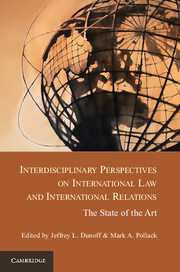 Interdisciplinary Perspectives on International Law and International Relations
Interdisciplinary Perspectives on International Law and International Relations Book contents
- Frontmatter
- Contents
- Contributors
- Acknowledgments
- Part I Introduction: Setting the Stage
- Part II Theorizing International Law
- Part III Making International Law
- Part IV The Interpretation and Application of International Law
- 14 The Multiple Roles of International Courts and Tribunals
- 15 The Design of Dispute Settlement Procedures in International Agreements
- 16 Whose Agents? The Interpretation of International Law in National Courts
- 17 International Judicial Independence
- 18 The Politics of Treaty Interpretation
- Part V Enforcement, Compliance, and Effectiveness
- Conclusions
- Index
- References
14 - The Multiple Roles of International Courts and Tribunals
Enforcement, Dispute Settlement, Constitutional and Administrative Review
Published online by Cambridge University Press: 05 January 2013
- Frontmatter
- Contents
- Contributors
- Acknowledgments
- Part I Introduction: Setting the Stage
- Part II Theorizing International Law
- Part III Making International Law
- Part IV The Interpretation and Application of International Law
- 14 The Multiple Roles of International Courts and Tribunals
- 15 The Design of Dispute Settlement Procedures in International Agreements
- 16 Whose Agents? The Interpretation of International Law in National Courts
- 17 International Judicial Independence
- 18 The Politics of Treaty Interpretation
- Part V Enforcement, Compliance, and Effectiveness
- Conclusions
- Index
- References
Summary
As this volume demonstrates, scholarly interest in international law's intersection with international politics is growing. Much international law (IL) scholarship excludes international courts (ICs) from the conversation, dismissing as irrelevant or dysfunctional the international legal institutions that elaborate and help enforce the law. The proliferation, rising usage, and growing political importance of international courts around the world makes this standard disclaimer increasingly less viable. Many domains of IL – international economic law, human rights law, criminal law, administrative law, and even constitutional law – have become judicialized. The judicialization of international relations (IR) occurs when courts gain authority to define what the law means and where litigation becomes a useful way to reopen political agreements. Negotiations among actors become debates about what is legally permissible, and politics takes place in the shadow of courts, with the lurking possibility of litigation shaping actor demands and political outcomes.
In an effort to broaden the debate about the role of ICs in the international legal system, this chapter draws from a study of the universe of operational ICs, examining ICs as a category of actors. Section I, “The Twenty-First Century International Judicial Order,” gives an overview the international judicial system as it exists today. Section II, “The Four Roles of International Courts,” describes the four roles that states have delegated to ICs. The enforcement role has ICs assessing state compliance with IL. The administrative review role involves ICs reviewing the decisions of administrative actors in cases raised by private litigants. The constitutional review role has courts assessing the legal validity of legislative and government actions vis-à-vis higher-order legal obligations. The dispute settlement role is perhaps the broadest judicial role, in that ICs have the general jurisdiction to issue binding interpretations in any dispute that is brought. After defining the four roles, I map these roles onto the universe of ICs in operation as of 2006, reporting the result of a coding of the statutes where the jurisdictions of the twenty-five ICs are defined.
- Type
- Chapter
- Information
- Interdisciplinary Perspectives on International Law and International RelationsThe State of the Art, pp. 345 - 370Publisher: Cambridge University PressPrint publication year: 2012
References
- 2
- Cited by


